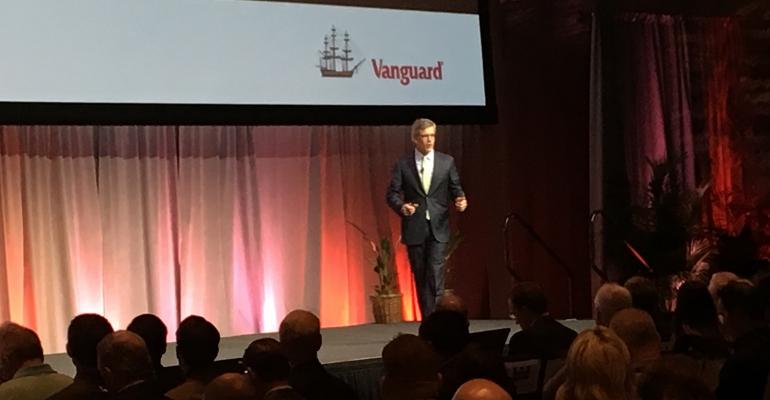The new CEO of Vanguard continued his predecessor’s warning for advisors: Adapt to the technological changes and fee compression roiling the investment management industry, or get left behind.
Like everyone, financial advisors embrace technology, except when it comes to their own businesses, said Mortimer “Tim” Buckley, the 46-year-old CEO of the low-cost money-management titan as he kicked off the Inside ETFs conference in Hollywood, Florida on Monday morning. The conference brought some 2,400 asset managers and advisors together to chart the landscape for exchange traded funds. When it comes to the their own industry, he said, advisors still too often see technology as a threat.
And it is, at least for advisors who charge clients primarily for an asset allocation plan. Buckley’s keynote came just weeks after Vanguard’s own Private Advisor Services announced it topped $100 billion in assets, making it among the fastest growing of all the automatic investment platforms that have come into the market in recent years.
More to the point for conference attendees, Vanguard’s PAS matches clients who meet a $50,000 asset threshold with a live financial advisor to field questions and give advice, a service that puts it in competition with many at the conference.
During a press briefing after the keynote, Buckley pointed out that more than 90 percent of the assets in PAS were not new investors, but converted from the firm’s current direct account holders. He suggested that the automation of investment management was so easy, he could foresee a time when a PAS-type service was the “default” for all of the firm’s direct investors.
But Buckley said there’s still a future for advisors who “embrace the disruption” and understand that their value lies not in asset management or allocation plans, but in managing client behavior, moving away from commission-based business models and toward fee-based advice. Those are the advisors winning the battle for investors’ assets. “You have dealt for a decade with the rise of fee-based advice. You have fueled the rise of low-cost investing.”
Advisors must understand that with mutual fund and ETF fees coming down, they are often now the single highest cost for their clients, Buckley said.
The issue is particularly germane, given Vanguard’s expectations of paltry market returns. The firm estimates a balanced portfolio (60 percent stocks and 40 percent bonds) will return 4 to 4.5 percent over the next decade, far behind the historical return of 8-plus percent.
The growth of robo advising foreshadows a lot of the changes in the advice industry, he said. It doesn’t matter which firms among the current crop of robo advisors survives and which don’t, he said. The change toward auto-allocation is not going to reverse. Buckley cited a recent University of Oxford study showing that 58 percent of investment advisor jobs are subject to automation. “They’re talking about jobs in this room,” he said. In the future, “this conference will be able to take place in a smaller hotel.”
Four years ago, Vanguard calculated that advisors’ performance of three basic tasks generated significant value for clients’ investment portfolios. Low-cost portfolio construction added 40 basis points, rebalancing added 30 to 40 bps and tax efficiency added 80 to 100 bps.
The more complicated task of behavioral coaching—making sure clients don’t chase returns, load up on bitcoin, etc.—added 150 bps.
But now the three basic tasks have been automated, Buckley explained. Vanguard’s PAS, for instance, charges 30 bps.
Advisors would be wise not to fight this trend, he said. “Either code it [the basic tasks] yourselves or partner with people who want to do it for you at a cheap price.” Currently, advisors are spending a hefty 40 percent of their time on those three job functions, Buckley said.
So then how should advisors spend their time? “We suggest you spend it on uniquely human tasks,” he said. “Behavioral coaching is difficult to code.” When volatility returns to financial markets, some advisors’ customers will panic and others won’t even pay attention, Buckley said. “The behavioral coaching depends on you.”
Then there are custom solutions advisors who can offer in areas such as estate planning, long-term healthcare and retirement. “You don’t measure that in basis points, you measure it in less anxiety” for customers, Buckley said. “It’s tough to pull off. You must spend time to know clients better.”
How do your clients want to spend their time during retirement? Most of the retirees Vanguard sees underspend in retirement, because they are concerned about medical expenses and being a burden on their children, Buckley said. “Imagine if you can allay those fears. They can live better in retirement.”
Advisors should learn everything about their clients—their children, the family business, their passions, he said. If you know these areas, it’s easier to create a structure for the human tasks, Buckley said. “These things are tough to measure, but have value. Your clients want to trust you, and they want communication, price and performance.”
Try to provide all of it, he said. “Give them that grand slam. You can embrace this as an opportunity to free up more time to create better solutions for your clients.”
For more coverage live from Inside ETFs, visit our conference coverage page.





